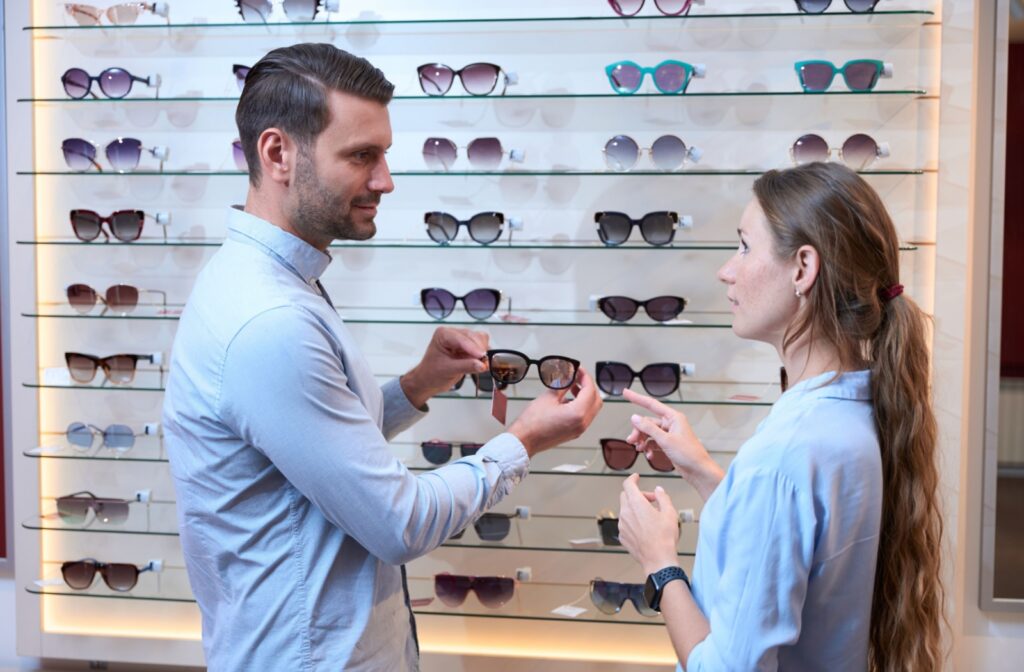Squinting or shielding your eyes is a very normal response to bright light, especially when the sun’s rays feel more potent during these warm summer months.
If your eyes seem more sensitive or uncomfortable than others every time you step outside on a bright day, you could be experiencing sun sensitivity or photophobia.
Photophobia is a symptom of an underlying issue and can vary from person to person. It can stem from:
- Eye color
- Dry eyes
- Eye conditions
- Extensive screen time
- Migraines or certain medications
Though shedding some light on these factors is helpful, the first step on the road to true eye comfort and relief is visiting your optometrist.
All About Sun Sensitivity
Sun sensitivity, or photophobia, isn’t an eye condition itself. Rather, it’s a symptom of an underlying issue. It means your eyes are overly sensitive to light, especially sunlight. This can range from mild irritation to severe discomfort, depending on the cause.
Everyone’s eyes naturally react to bright light to some extent, but people with light-colored eyes, certain eye conditions, or specific sensitivities can experience significantly more discomfort.
If you’re wondering whether your discomfort qualifies as photophobia, here are some symptoms to watch out for:
- Squinting or closing your eyes in bright light
- Eye strain or headaches outdoors
- Excessive tearing or watery eyes when sunlight is intense
- Feeling the need to wear sunglasses even in moderately lit settings
If any of these signs ring a bell, especially if they interfere with daily life or worsen with time, it may be time to explore potential causes.
What Causes Sun Sensitivity?
Light sensitivity to the sun is completely normal, especially in bright or high-glare conditions. Naturally, your eyes squint or adjust in response to sudden sunlight exposure.
What is concerning is if you find even moderate light conditions unbearable or painful, triggering watery eyes or headaches. This points to intense sensitivity that is not typical.
Your eyes can suddenly become sensitive to sunlight for several reasons. Below are some of the most common causes.
Eye Color
One of the simplest reasons for light sensitivity lies in your genetics.
People with lighter-colored eyes (like blue or green) tend to have lower melanin levels in their irises. Melanin is a pigment that acts as a natural filter for bright light, so lower levels can result in greater sensitivity to sunlight.
Dry Eyes
Dry eyes often make it harder for your eyes to cope with sunlight.
When your tear film isn’t working as well as it should, your eyes feel drier, irritated, and more sensitive, even to sunlight. Dry eyes are common, and factors such as extensive screen time, dehydration, environmental conditions, and medications can aggravate existing symptoms.
Artificial tears are convenient and offer quick and effective relief. These eye drops mimic natural tears, hydrating the eye’s surface and helping to reduce friction and irritation from sunlight.
Managing dry eyes with at-home remedies, like artificial tears, and advanced therapies can help restore balance to the tear film, keeping your eyes moist and comfortable.
Eye Conditions
If you have certain eye conditions, they can make you more sensitive to sunlight. These include:
- Corneal abrasions: Any damage to the cornea can heighten sensitivity.
- Cataracts: These clouding formations can scatter light more, making you more sensitive to brightness.
- Conjunctivitis (pink eye): Eye infections often lead to light sensitivity as part of the inflammatory response.
Not to mention, with age comes wisdom and natural changes in our visual system. Age-related vision changes, like presbyopia or glaucoma, can affect how your eyes respond to sunlight.

Too Much Screen Time
We can’t escape from the digital demands of the modern day. Although computers and smartphones make everyday life more convenient, spending long hours on digital screens (or any extensive focus work) leaves your eyes feeling fatigued and sore.
Preventing digital eye strain can be as simple as following the 20-20-20 rule. Every 20 minutes, take a 20-second break and look at something at least 20 feet away. This allows your eyes to relax.
Migraines or Medications
Photophobia is a common symptom for people who experience migraines. Certain neurological disorders, such as meningitis, can also induce extreme light sensitivity.
If you also experience throbbing headaches alongside sun sensitivity, your eyes may not be the issue—it could be neurological.
Light sensitivity can also be a side effect of certain medications like antihistamines, diuretics, or antibiotics. If you’ve recently started new medications, they could affect your eyes.
How Sun Protection Can Help
Staying proactive about sun protection is not just about keeping your eyes comfortable. More than shielding your eyes from light sensitivity, investing in quality UV-protective eyewear safeguards your eyes from the sun’s harmful rays.
UV radiation can lead to cumulative damage over time, increasing your risk of developing conditions like cataracts and macular degeneration. Even if you don’t feel discomfort in sunlight, proper eye protection (just as we do with sunscreen) is vital for everyone.
Wear Quality Sunglasses
Investing in a good pair of sunglasses (prescription or non-prescription) isn’t optional, especially if your eyes are sensitive. Sunglasses are powerful, not because of their dark tint (which doesn’t even grant solid sun protection), but because of how effectively they can shield your eyes from the sun’s harmful rays.
Look for sunglasses with the label “100% UV protection” or “UV400,” which can block 99–100% of UVA and UVB rays. Purchasing quality lenses from your optometrist is always the way to go.
Polarized sunglasses with UV protection go a step further, minimizing glare (particularly helpful if you’re an avid outdoor lover), while enhancing the quality of your vision and color vibrancy.
You can also combine protective eyewear with a wide-brimmed hat. This acts as a secondary shield for your eyes by blocking direct sunlight.
Experience the Power of Sun Protection
Sensitivity to bright light might feel natural, but persistent discomfort could indicate an underlying concern. With the right protective measures and routine eye exams, you can experience the joys of outdoor adventures without discomfort.
If sun sensitivity is a regular or worsening issue, it’s time for a routine eye exam. Connect with our Total Vision Carlsbad Plaza team to book an appointment today.



